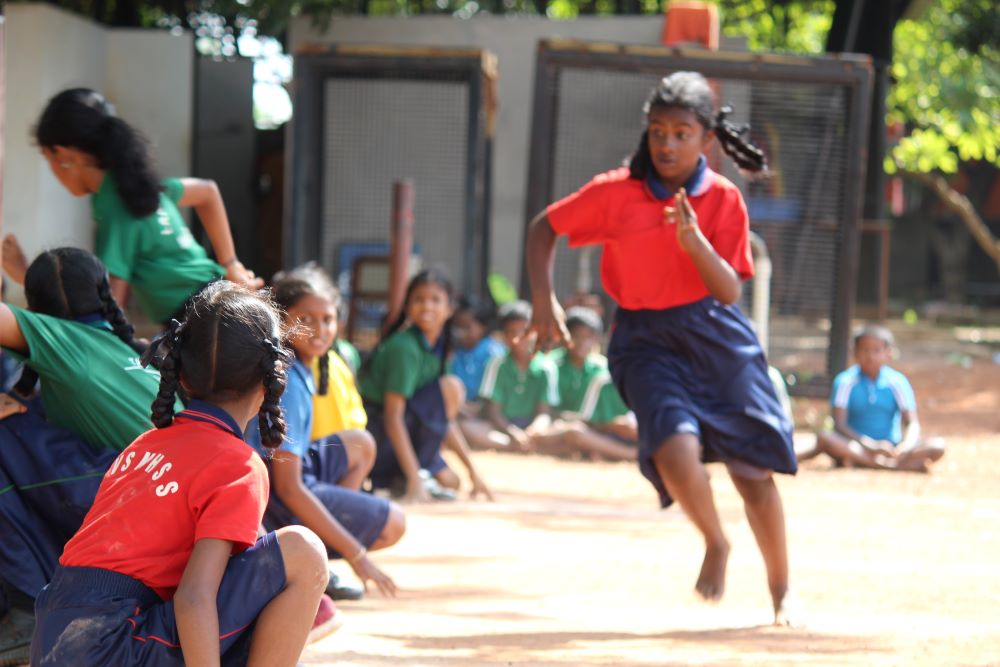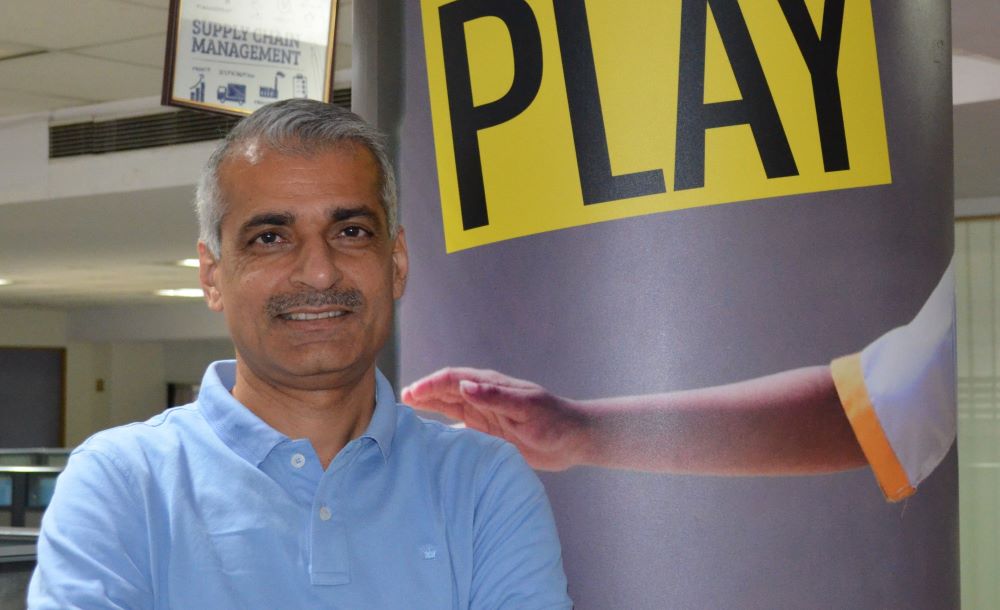Mr Parminder Gill is the Co-founder & Head of Sportz Village Foundation. His organisation is working towards improving the health and fitness of children through various sports activities. It also works with various corporates to implement sports projects for children belonging to underprivileged communities.
In this interview, Mr Gill elaborates on his organisation’s journey, its scale of operation and its achievements. He also shares his insights into the key challenges in implementing sports related CSR projects and its impact reporting.
He says that there has been an increasing realization among corporates that Sport can be used as a powerful tool that can help accelerate the existing impact from traditional interventions in improving educational and developmental outcomes in children and adolescents.
Scroll down to read the interview…
Q: When did the Sportz Village Foundation’s journey begin? What are the milestones in your journey so far?
A: Play is the fundamental human need just as are food, clothing, shelter and education. Established in 2003, Sportz Village’s philosophy is pillared on improving the health and fitness of children and getting everyone to experience the magic of sports. At Sportz Village, we are trying to make the world a better place by getting 100 million children to play. We have four specialized units that focus on building sports enabling platforms that cater to various stages of a child’s development.
Sportz Village Foundation (SVF) was founded in 2017 with the objective to transform the lives of children belonging to underprivileged communities through CSR partnerships. We work with corporates and governments to integrate structured Sports and Physical Education curriculum in public schools under the key ‘Sport for Change’ program. It uses physical activities and sports to drive change in schools in terms of health, education, and empowerment of children. The program is scientifically researched, highly tested, and well-integrated into the core education process of the schools.
Currently, we work with over 1300 schools in 250 different places, widely impacting over 7,00,000 kids. SVF also serves as a strategic partner and advisor for sports education for the boards of the NSDC, CII, NITI Aayog, and state governments.
Q: Please tell us about your Sport Development Centres (SDC) or High-performance Learning (HPL) Centres. How is it helping sports performance of students and sports enthusiasts?
A: Our core program focuses on integrating sports and physical education in the existing curriculum. Sport Development Centres (SDC) or High-performance Learning Centres (HPLC) are set up as part of Sports Excellence Pathway for interested or high-performing students who want to improve their sports skills or pursue career in sports.
Selected students are imparted special training by expert coaches at High Performance Learning centers. Student-athletes at these centers are also provided necessary sports kits as well as nutrition kits that motivate students to participate, practice regularly and improve their performance. They are given match exposure through friendly and inter-school matches, and several performing students go on to represent at district, zonal, state and national level. Such success stories help raise the standard for other students as well, encouraging higher participation; and help achieve the ultimate goal of improved educational, health and learning outcomes in students - using sport.
Q: Sportz Village Foundation has been working with different corporations to prepare school students for various sports. How has been the participation of your trained students in national or state level sports competitions?
A: There are many success stories. Our program supported by HCL Foundation has been successfully offering special training to select student athletes (both girls & boys) from the total of 15000+ program beneficiaries. They are being imparted necessary resources and match exposure at various inter-school and intra-school tournaments. And about 400+ student-athletes have been selected for district, mandal,  state and national level tournaments.
state and national level tournaments.
Q: You have been working with various corporates on sports training. What is it that corporates want to achieve via their CSR initiatives in partnerships?
A: Traditionally, Corporates have been spending their CSR budgets in creating sports excellence programs or for identifying and developing talented athletes from the communities they have already been engaged with – for various development programs. While athlete development still remains a core charter of many corporates where we are helping them build pathways for building athletes and sportspersons in the rural and urban communities – there also has been a gradual shift in using sport to help accelerate the impact in their mainstream programs in Education, Health, Gender Inclusion and Youth Development/Employability. Some of our largest programs in recent years have been focussed on improving educational and developmental outcomes of children, young girls and youth in the schools and communities.
Q: Sports as a CSR area is still very small in terms of total CSR funds spent by corporations. What, according to you, are the basic challenges that companies face in increasing their CSR budget for sports related initiatives?
A: Currently, over 80% of existing CSR spend from Corporates typically goes into areas such as Education, Health, Women Empowerment and Employability – supporting children/ youth/women from disadvantaged communities. With increasing evidence available through research done by organizations like us in India – and many others globally - there has been an increasing realization in Corporates that Sport can be used as a powerful tool that can help accelerate the existing impact from traditional interventions in improving educational and developmental outcomes in children and adolescents. This thinking is also driving many Corporates now to adopt or use sport for a broader developmental change – beyond the narrow definition or lens of sports excellence or athlete development – as evident from the funding support received by us (in recent years) – which is focussed on improving education, health and development outcomes.
Q: Can you tell us a few specific initiatives that you have taken with corporate partners and the impact those initiatives have created?
A: Two of such recent initiatives were launched during the COVID-induced lockdown. Government guidelines for school closure for all grades resulted in delay in launching our physical baseline program for all students. To keep children active during lockdown, Sportz Village Foundation engaged school children by offering a unique ‘play/activity’ based remote learning environment through digital as well as offline interventions. Play at Home ‘Leaderboard’ (digital) was developed to engage children with access to the internet as a ‘gamified’ online platform that assigned weekly fitness activities to children on sports skills, yoga, self-defence and health education. Whereas Race Around India (RAI) program used offline/ gamified tools such as Workbooks to get children active in their homes and communities even without digital access.
These programs were supported by DXC Technologies, HCL Foundation, Godrej Agrovet and Bata India and engaged over 15000+ students in physical activity and sports during the extended lockdown period.
Q: Please elaborate on your initiatives where you work with Decathlon employee volunteers? How does it work?
A: Under a unique partnership with Decathlon, we launched our in-school Physical Education program in a cluster of schools in Bengaluru and Delhi NCR with an aim to ensure smooth return of 2000+ students (grades 1 to 8) to schools and improve fitness, academic and social-emotional levels of the children.
The program also aims to train and engage Decathlon employee volunteers to implement the Sportz Village structured sports curriculum in the partner schools with continued capacity building, execution support, monitoring and impact assessments by Sportz Village Foundation. Decathlon India has been dedicated to the cause of ‘Sports for School Children’ since 2014. We are planning to extend this employee-volunteer program with Decathlon to two more cities.
Q: What are the key challenges in implementation of sports related CSR projects? What could be the solutions for these challenges?
A: Based on our experience for over last years, we would like highlight two key challenges in implementing sports interventions:
- Impact evaluation: For running and sustaining large, scaled sports programs - mapping and measuring key indicators on an ongoing basis is a big challenge. Lack of appropriate evidence or measurable impact could also lead to Corporates exiting from a program prematurely. At Sportz Village Foundation – we have a huge focus on collecting appropriate data – helping us measure and report change on an ongoing basis. Which has been possible because of our central investments in appropriate tools/ technology for data collection, and capacity building of our resources to ensure that evidence collection is instrumented into our core implementation process.
- Sustainability: Getting communities to adopt or sustain the program after the funding support ceases has been a huge challenge not just for sports interventions but also for other development programs. At SVF, we have structured our program roll-out in a phased manner – where the first phase focuses on measuring and advocating the change from the program, second phase includes mobilizing and building capacity of the youth from the community to support the program, and the last phase includes transferring the program to the community – including getting a buy-in for providing minimal financial incentives to sustain the program.
Q: CSR initiatives in sports are generally long-term projects as it takes time to create impact. However, CSR policy requires strict annual impact measurements of each CSR initiative. What are your suggestions to corporates and policymakers towards impact measurement parameters of CSR initiatives in sports so that it becomes viable for them from a CSR reporting perspective?
A: In our programs, we typically track indicators at 3 levels viz. input/ process level, output level and outcome level. Process level metrics are typically tracked as part of the ongoing program such as number of sessions completed or trainer attendance, output level is typically on an annual basis – example would be skill or fitness assessments at baseline and end line. Lastly, outcome level – takes care of the longer term change (longitudinal, over multiple years) to look at the impact of the sports intervention on educational, behavioural outcomes or areas such as gender & inclusion based on the mandate. These measures help us align with the CSR as well as SDG reporting mandates.
Q: Any message to corporates on incorporating sports activity as part of their CSR programmes?
A: Evidence has shown us that Sport as a tool helps build deeper engagement with children, adolescents, girls and youth. This engagement can be used as a powerful tool to accelerate change in critical areas such as education, health, and youth development – complementing (and in conjunction with) other non-sport interventions currently being used in the development space.





 state and national level tournaments.
state and national level tournaments.












.jpg)



